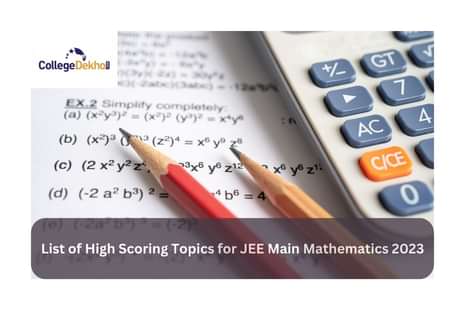Important topics of JEE Mains 2024 Exam for Mathematics section have been provided in this article in detail. Candidates can check all the topics and their weightage for a better understanding.
- Omitted Topics from JEE Main Mathematics Syllabus 2024
- Most Important Topics of Maths For JEE Main 2024
- Weightage Wise Topics of Math for JEE Main 2024 (Higher …
- Important Topics for JEE Main 2024 Mathematics
- JEE Mains Topic-wise weightage for Mathematics
- Mathematics JEE Mains 2023 Paper Topic Wise Weightage
- How to Prepare for Mathematics Section in JEE Main 2024
- Benefits of Studying the Topics Covered in Previous JEE Exams

List of High Scoring Topics in Mathematics for JEE Main 2024:
The National Testing Agency has revised the syllabus of JEE Main 2024 Mathematics. Every year, question paper analysis of JEE Main is done by various experts and it has been witnessed that candidates mention Maths to be the most difficult or lengthy section in the entire JEE Main question paper. If you have begun the preparation and feel the same way, then read this article till the end. We at College Dekho have compiled data from previous years’ question papers to give you a list of topics that are expected to have the most influence on the JEE Main 2024 Maths Section.
Latest:
JEE Main 2024 April 4 Questions Live
Also read:
JEE Main Question Paper April 2024 with Answer Key
Mathematics is the foundation of complex engineering calculations. Most of the questions in the Mathematics section of JEE exams are based on formulas and their applications. To perform well in this section, you must practice a lot. Your speed and accuracy will improve the more problems you solve. It would be hard to succeed in math by relying solely on memorization and reading of formulas. Visualize and apply each key principle to actual word problems as you work to understand it. There are numerous topics in the mathematics syllabus for JEE, and unlike the chemistry or Maths syllabuses, there is no such thing as a "less important" or "extremely significant" topic because most of the topics are interconnected. Consequently, you cannot omit any particular section to focus more on any other section. Every year, the competition for the
JEE Main 2024
examination escalates, making it important for candidates to find efficient study methods to improve their chances of passing the test.
It will be easier for candidates to understand the weight that should be assigned to various topics if they have a solid understanding of JEE Main Topic-wise Weightage determined by the analysis of the previous year's exams. Read ahead to get a clearer understanding of the List of High Scoring Topics for JEE Main Mathematics 2024.
Omitted Topics from JEE Main Mathematics Syllabus 2024
As NTA has revised the entire syllabus of JEE Main, a few chapters that are entirely deleted are Mathematical Reasoning and Principle of Mathematical Induction. Candidates can find out what topics and chapters have been removed by going through the JEE Main Deleted Syllabus 2024 . While the chapters that are [partially omitted include-
- Family of lines, Equation of angle bisectors from Straight Lines
- Planes from 3D-Geometry
- Equation of tangents and normals from Circles and Conics
- Trigonometric equations, Height, and distance from Trigonometry
- Equations of internal and external bisectors of angles between two lines, Equation of the family of lines passing through the point of intersection of two lines, Condition for a line to be tangent to a circle, and equation of the tangent, Condition for y = mx + c to be a tangent, Point(s) of tangency from coordinate geometry
- Bernoulli's trials, Binomial distribution from Probability
- Cube roots of unity, Triangle inequality from Complex numbers, and quadratic equations
- Properties of binomial coefficients from Binomial theorem
- AGP, Summation of series from Sequence and series
- Tangents and normals, Mean value theorems from Limits, Continuity and Differentiability
- Definite integral as a limit of sum from Definite integration
Also Check, JEE Main Subject Wise Syllabus 2024
Most Important Topics of Maths For JEE Main 2024
The table below provides the most important Maths topics, categorized by chapter, that will help you perform well in the JEE Main 2024 Exam. We have listed the most important Math topics for JEE Main 2024 after reviewing and analyzing the question papers from previous years. While preparing for the JEE Main 2024 Exam, candidates should make sure they do not overlook any of the listed topics.
Name of Chapter | Name of the Topics | Important Topics |
|---|---|---|
Sets, Relations and Functions |
|
|
Complex numbers and quadratic equations |
|
|
Matrices and Determinants |
|
|
Permutations and combinations |
|
|
Binomial theorem and its simple applications |
|
|
Sequence and series |
|
|
Limit , continuity and differentiability |
|
|
Integral Calculus |
|
|
Differential equations |
|
|
Co-ordinate geometry |
| Distance between two points |
Three Dimensional Geometry |
|
|
Vector Algebra |
| |
Statistics and Probability |
| |
Trigonometry |
| |
Mathematical reasoning |
| Tautology And Contradiction |
Weightage Wise Topics of Math for JEE Main 2024 (Higher and Lower Weightage)
The table here gives a much clearer idea as to which topics of Maths fall under a higher weightage radar whereas the topics that have subsequently low weightage based on previous years’ question patterns.
High Weightage | Low Weightage |
|---|---|
3 Dimensional Geometry | Differential Equation |
Vectors | Differentiation |
Determinant & Matrices | Trigonometric Equation |
Sequence & Series | Statistics |
Straight Line | Mathematical Logic |
Circle | Set & Relation |
Probability Distribution (Binomial + Mean & Variance) | Height & Distance |
Definite Integral & Area Under the Curve | Trigonometric Ratio & Functions |
Limits, Continuity & Differentiability | Properties of Triangle |
Functions | Permutation & Combination |
Application of Derivatives | Indefinite Integral |
Conic Sections | - |
Complex Number | - |
Quadratic Equation | - |
Binomial Theorem & M. I. | - |
Important Topics for JEE Main 2024 Mathematics
The marks in the JEE Main Mathematics section are distributed evenly across all chapters. The JEE Main exam requires knowledge of all 15 chapters, each of which is important. As a result, you can prioritize concentrating on a few chapters that are easy and the chapters that you understand thoroughly.
The following are the highest-scoring topics and important chapters for JEE Main in Mathematics:
- Sequence & Series
- Determinants and Matrices
- Sets and relations
- Mathematical Reasoning
- Statistics & Probability
- Vector & 3D
- Straight line
- Circle
- Definite Integral
- Indefinite Integral
- Application of Derivatives
- Differential equation
- Application of Integrals
- Trigonometric Ratios
JEE Main 2024 Maths Easy And Important Chapters
- Statistics- 4 marks
- Height and Distance- 4 marks
- Mathematical Reasoning- 4 marks
- Matrices and Determinant- 8 marks
- Sets, Relation and function- 8 marks
- Vector and 3D- 8 marks
- Quadratic equation- 4 Marks
- Area- 4 marks
- Limit, continuity and derivability- 8 marks
- Conic section- 12 marks
Note-
- After you've finished the most important topics, you should go on to the following: Limits and Continuity, Permutation and Combination, Quadratic Equations, Complex Numbers, Binomial Theorem, Circles, Sequences and Series, and Differential Equations.
- You can concentrate on the easier and less significant topics, such as Inverse Trigonometry, Application of Derivatives, Heights and Distances, and Statistics, after finishing the chapters on the list above.
- Sets, Relations, and Functions form the foundation of Mathematics, so you don't have to start from scratch.
JEE Mains Topic-wise weightage for Mathematics
The table below shows a detailed presentation of different JEE Main 2024 Maths topics, the number of questions, total marks that comprise the question paper from the relevant topic, and the weightage of the particular topic in percentage.
Topic | No. of Questions | Total marks | Weightage |
|---|---|---|---|
Coordinate Geometry | 5 | 20 | 16.67% |
Limits, continuity, and Differentiability | 3 | 12 | 10% |
Integral Calculus | 3 | 12 | 10% |
Complex numbers and Quadratic Equation | 2 | 8 | 6.67% |
Matrices and determinants | 2 | 8 | 6.67% |
Statistics and Probability | 2 | 8 | 6.67% |
Three-dimensional geometry | 2 | 8 | 6.67% |
Vector Algebra | 2 | 8 | 6.67% |
Sets, relations, and function | 1 | 4 | 3.33% |
Permutation and Combination | 1 | 4 | 3.33% |
Binomial theorem and its Application | 1 | 4 | 3.33% |
Sequences and Series | 1 | 4 | 3.33% |
Trigonometry | 1 | 4 | 3.33% |
Mathematical Reasoning | 1 | 4 | 3.33% |
Differential Equation | 1 | 4 | 3.33% |
Statistics and Dynamics | 1 | 4 | 3.33% |
Differential Calculus | 1 | 4 | 3.33% |
In JEE Main Mathematics section syllabus is the same for B.E/B. Tech and B.Arch as well as B.Planning papers. With 25% difficult questions, 25% easy questions and around 50% questions of moderate difficulty level, it becomes important for candidates to understand the topic with high weightage.
The most important topics from Mathematics Syllabus include- Coordinate Geometry, Calculus, and Algebra with around 17% weightage.
Mathematics JEE Mains 2023 Paper Topic Wise Weightage
Candidates who will be taking the JEE Mains 2024 should also check the JEE Mains mathematics paper topic wise weightage in order to develop an understanding of the weightage for each topic and also comprehend the number of questions they can expect in the 2024 paper.
Unit | No of Questions | Marks Allotted | Weightage |
|---|---|---|---|
Coordinate Geometry | 5 | 20 | 16.67% |
Limits, Continuity And Differentiability | 3 | 12 | 10% |
Integral Calculus | 3 | 12 | 10% |
Complex Numbers And Quadratic Equation | 2 | 8 | 6.67% |
Matrices And Determinants | 2 | 8 | 6.67% |
Statistics And Probability | 2 | 8 | 6.67% |
Three-Dimensional Geometry | 2 | 8 | 6.67% |
Vector Algebra | 2 | 8 | 6.67% |
Sets, Relations And Function | 1 | 4 | 3.33% |
Permutation And Combination | 1 | 4 | 3.33% |
Binomial Theorem And Its Application | 1 | 4 | 3.33% |
Sequences And Series | 1 | 4 | 3.33% |
Trigonometry | 1 | 4 | 3.33% |
Mathematical Reasoning | 1 | 4 | 3.33% |
Differential Equation | 1 | 4 | 3.33% |
Statistics And Dynamics | 1 | 4 | 3.33% |
Differential Calculus | 1 | 4 | 3.33% |
How to Prepare for Mathematics Section in JEE Main 2024
It is a good idea to keep a list of formulae and main concepts handy for Mathematics. Instead of relying on a pre-made list, it is preferable to create your own since you may modify it to your own needs when writing it out. The following are some areas that need to be prioritized:
Below are some topics where there should be a focus area:
- Coordinate geometry: As you go through the formulae, try to find connections among them; this will help in remembering during the exam. Don't forget to include geometrical aspects in your notes, especially for circles and straight lines.
- Trigonometry: Divide your notes on trigonometry into four categories: fundamental formulae, trigonometric equations, inverse, and triangle solutions. However, this chapter seems to include a lot of formulas. Keep in mind that JEE Main questions will most likely be based on the more typical results in practice.
- Algebra: This section mostly contains properties rather than many equations. Be aware of how symmetric sums of roots and equation transformations occur in quadratic or theory of equations. The geometric interpretation of certain formulae should be modified in Complex Numbers in order to make them more understandable and simple to memorize. Probability, permutations and combinations, and binomials are all related and ought to be changed collectively. Since the latter two are less formula-based and more focused on problem-solving techniques, it is a good idea to have highlighted a few sample problems to revise alongside them.
- Calculus: The standard limits, differentiation equations, and standard integration conclusions should be very clear to candidates. Revise the theoretical requirements for Continuity and Differentiability as well as the characteristics of Definite Integration in addition to this.
- Vector and 3-D Geometry: Given that they are connected, try to complete them simultaneously. The questions in this section are likely to involve standard formulae.
Related Links to Download JEE Main Question Paper PDF
One sure-shot way to score 90 percentile in JEE Mains 2024 is by solving the previous year's question papers. The table below features year wise JEE Main Question Papers that students can practice thoroughly after revision.
Benefits of Studying the Topics Covered in Previous JEE Exams
Some of the benefits of solving JEE Main previous years' papers PDFs with solutions 2023-2017 are mentioned here:
- Better Time Management
- Practice Makes Perfect
- Improve the JEE Main Preparation Methods
- Get Familiar with the Exam Pattern
- Evaluate the Areas of Strength and Weakness
- Revise regularly what you study
- Solve mock test papers
Better Time Management
By solving more and more papers, candidates will be able to understand the amount of time required to solve any particular question. Thus, one of the most significant advantages of solving previous years' JEE Main question papers is time management. It not only increases speed and time management but also enhances accuracy. Proper time management can produce significant benefits for candidates appearing in JEE Main.
Practice Makes Perfect
As the old old saying goes, practice makes a main perfect. Thus practicing things again and again will help candidates yield better results. Previous year's JEE Mains practice papers can only help determine the level of preparation. The candidates can quickly evaluate their level of preparation. Moreover, candidates can focus on decreasing the preparation gap based on their assessment.
Get Familiar with the Exam Pattern
The JEE Main exam is one of the most difficult national-level examinations, and the competition is tough. Solving previous year papers will help candidates in understanding the paper pattern in advance. Strategies of solving the questions can be easily figured out.
Evaluate your areas of strength and weakness
As you go through the question paper, make sure to read it attentively. Mark the questions that are known, and leave the others blank. It is the best technique for responding to both known and hypothetical topics. Once finished, candidates can quickly pinpoint the areas that require their attention and get to work. Additionally, candidates can now classify the exam as difficult, moderate, or easy after completing JEE Main question papers from prior years. They can now quickly start the updated pre-planning procedures as a result.
Solve Mock Test Papers
Students are strongly encouraged to complete mock tests on a regular basis. By completing mock exams, students can measure their level of preparation and develop better problem-solving techniques. It is recommended that students complete three hours of timed online mock exams. Candidates can choose the NTA portal or any other website that offers free mock tests to pass the JEE Main exams.
Revise Regularly What You Study
Revision is necessary for any exam no matter how thoroughly you are prepared. Revision helps candidates to remember the concepts better. Revising any topic will enable a candidate to memorize all the important points which otherwise they are not able to or are prone to forget during the exam.
Improve JEE Main Preparation Methods
The ultimate objective should be to enhance JEE Main preparation. You can get a sense of the exam pattern and the number of questions from different sections of the JEE Main syllabus 2024 PDF by solving the previous year's questions. As a result, students should always maintain flexibility in their timetables and approaches to studying for exams. It will automatically help them prepare and refine their preparation techniques.
Additionally, they can allot time for revising the most relevant syllabus update and spend more effort on their strong and weak areas.
We wish you all the best for your upcoming JEE Main exams!

















Similar Articles
WBJEE Choice Filling 2024 (Started): Link, Last Date, Process, Locking
List of Documents Required For WBJEE 2024 Counselling- Choice Filling, Registration Process, Fees
Do’s and Don'ts of WBJEE Counselling 2024
DTE MP B.E/ B.Tech Admission 2024 - Dates (Out), Counselling, Choice Filling, Seat Allotment
HP PAT 2025 Syllabus: Check Subject-Wise Detailed Syllabus PDF, Important Topics
CSAB Special Counselling Registration 2024: Dates, Steps to apply, and documents required